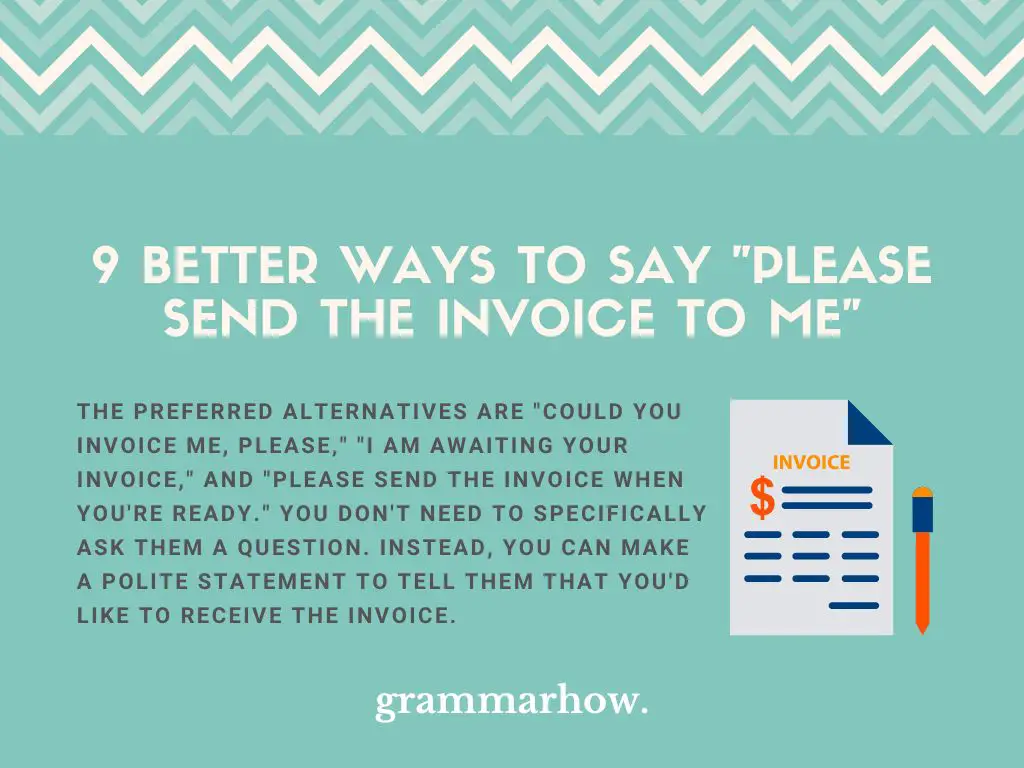
Have you ever wondered how to politely ask for an invoice in an email? It’s not all that complicated; you just need to know how to phrase your question. This article will look into some of the best ways you can ask someone to send you an invoice.

The preferred alternatives are “could you invoice me, please,” “I am awaiting your invoice,” and “please send the invoice when you’re ready.” You don’t need to specifically ask them a question. Instead, you can make a polite statement to tell them that you’d like to receive the invoice.
“Could you invoice me, please?” is a simple question you can use. It’s simple but effective, which is why it’s one of the best options to replace “please send the invoice to me.”
It shows that you expect someone to send you an invoice. “Could you” and “please” are polite ways to start a question to make sure that you receive what you’re asking for.
“I am awaiting your invoice” is a great statement you can make. It works well as an alternative because it shows that you’re being patient but would like to receive the invoice soon.
“Please send the invoice when you’re ready” is a great formal alternative. It allows you to ask someone to send an invoice without putting too much pressure on them if they’ve taken longer than you expected.
“When you’re ready” is the key here. It shows that you’re waiting for something, but you understand if someone is currently too busy to help you out.
“I’m ready to receive your invoice” is a great alternative. It shows that you’re eager to pay the invoice, and you hope that the recipient of the email will be able to get it sorted out for you.
“Ready to receive” is used here to show that you’re keen to pay. It works well in many cases, and you can use it as a formal alternative whenever necessary.
“Let me know when the invoice has been sent” is a good reminder you can use. Sometimes, invoices are sent to inboxes and immediately moved to the junk folder. This can make it challenging to know when the invoice is sent.
That’s why you should ask someone to confirm when they’ve sent the invoice. This phrase works well if you would like to double-check whether they’ve sent it through.
“I have not received the invoice yet” is a good way to confirm whether someone has sent you an invoice. “Yet” is used to show that you may have expected it earlier, but you still cannot find it in your invoice.
Before using a phrase like this, it may be wise to check your junk folder. If the invoice was moved to your junk folder, you might miss it. You would look foolish using this phrase if you were sent the invoice but didn’t look around for it.
“Is there an invoice that I can pay?” is a suitable question you can use in an email. Most of the other choices are statements, but that doesn’t mean questions like this can’t be effective when you want to pay for an invoice.
It’s very polite and doesn’t assume an invoice has already been made. Instead, it just asks whether there’s anything for you to pay yet or if you need to continue waiting for the time being.
“Would you care to send me the invoice?” is another suitable question alternative. You can use this when you want to check that someone is okay with sending you the invoice. If you think they have it ready, this phrase works well.
Be careful using “would you care” to start the question, though. It works well, but some people might see it as a bit rude or rushed.
“Send me the invoice, please” is a good choice if you’re looking for a commanding statement. It shows that you expect to receive the invoice promptly and would rather not be kept waiting.
You should use this phrase if you’re an important person in a company speaking to someone below you. It’s a good one to use as an order, but you will find that you won’t get much success from it if you try to order someone around who is higher than you.
Martin holds a Master’s degree in Finance and International Business. He has six years of experience in professional communication with clients, executives, and colleagues. Furthermore, he has teaching experience from Aarhus University. Martin has been featured as an expert in communication and teaching on Forbes and Shopify. Read more about Martin here.